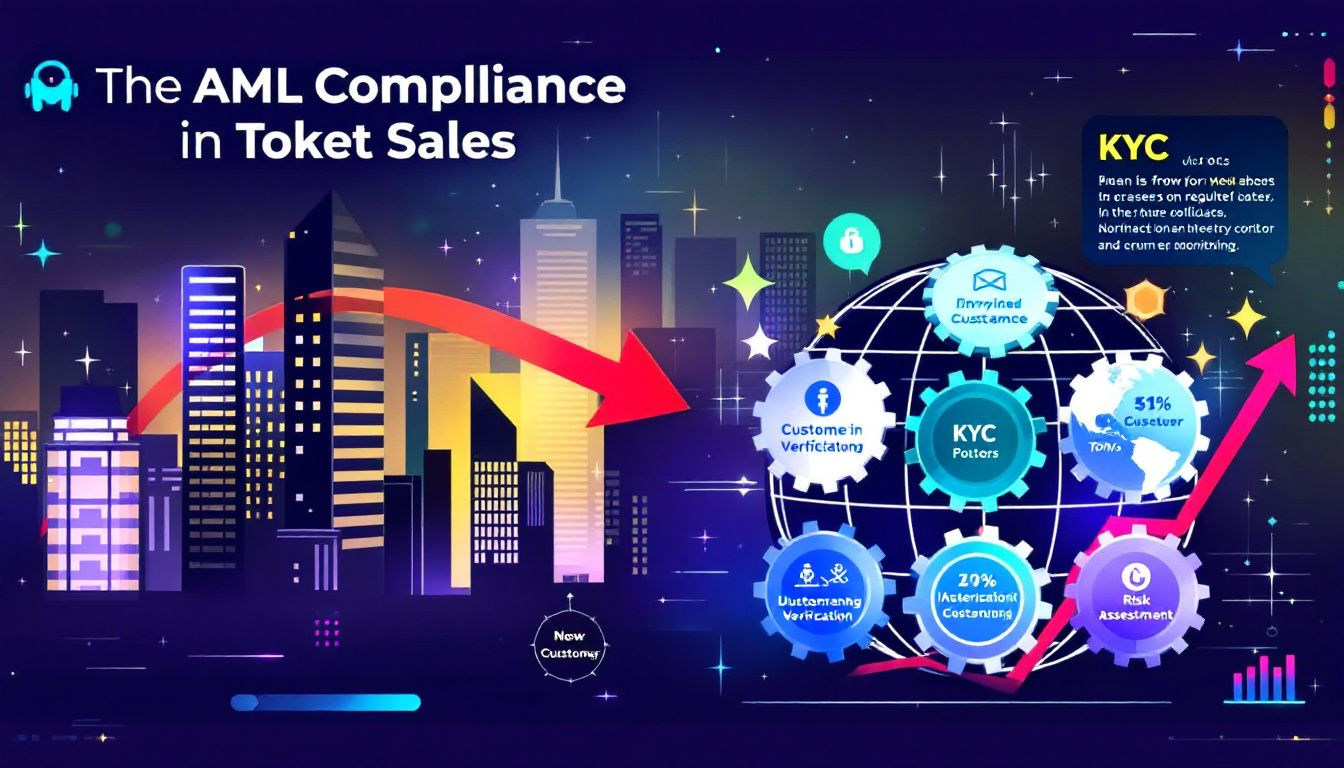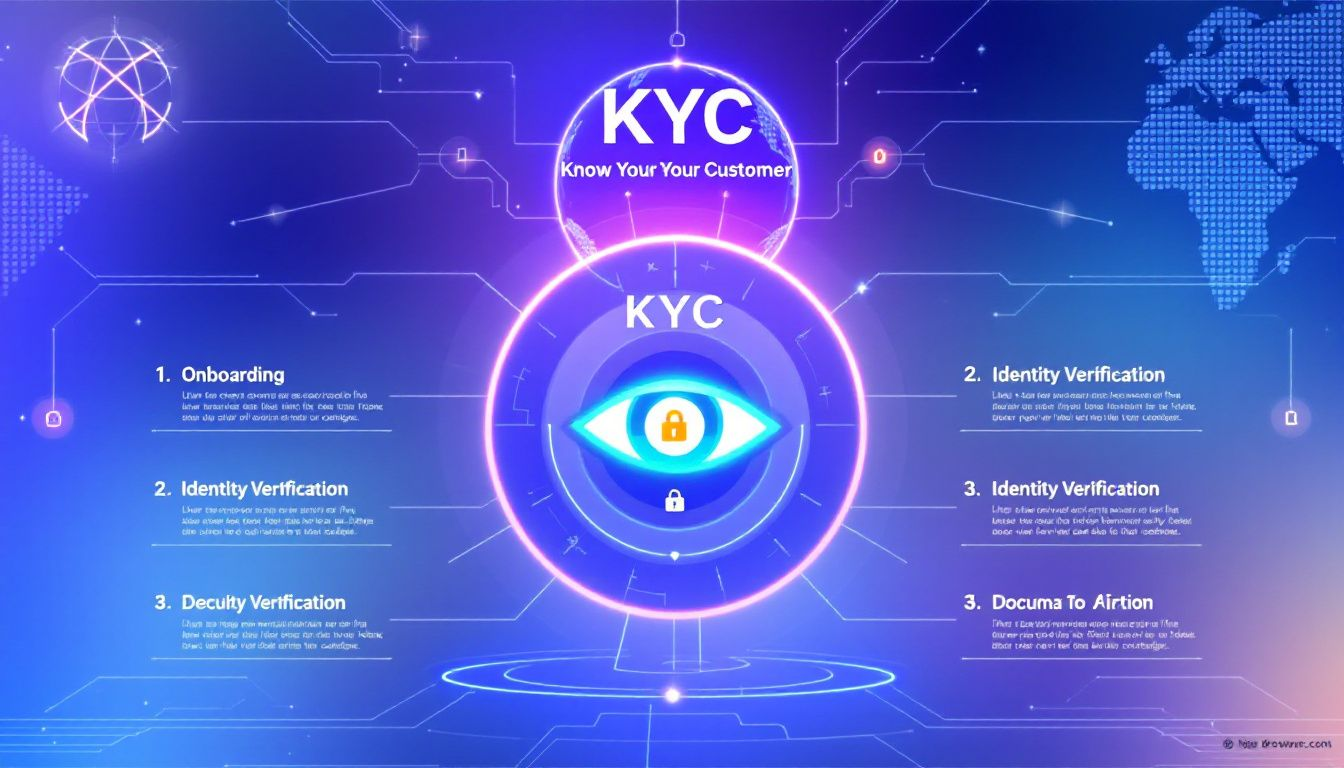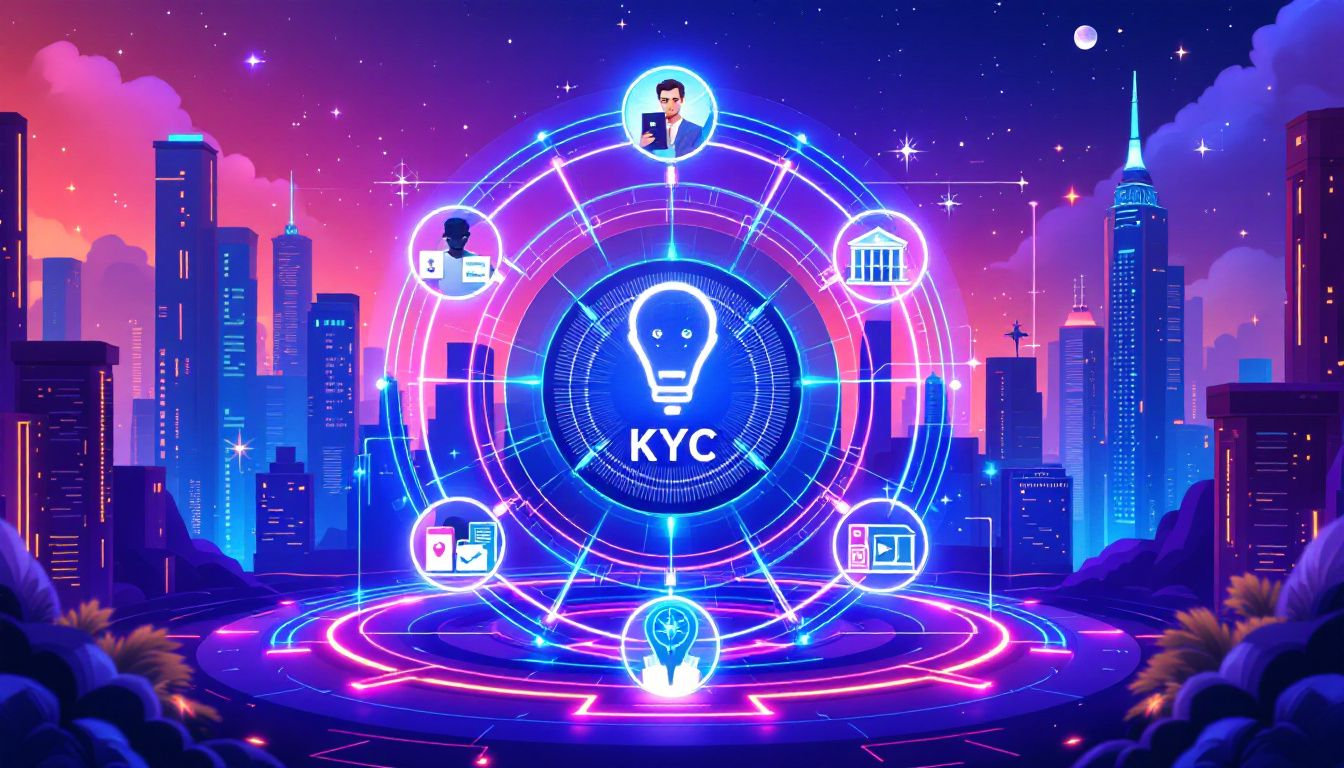KYC in ICOs is a critical step to verify investor identities and ensure compliance with regulations. It helps prevent fraud and builds trust among participants in the KYC ICO process. This guide will explore the key components of KYC, best practices, and how to implement them effectively.
Key Takeaways
-
KYC processes are essential for ICOs to verify investor identities, prevent fraud, and ensure regulatory compliance, requiring ongoing monitoring and robust procedures.
-
The choice of a KYC provider significantly impacts the effectiveness of compliance; factors to consider include provider reputation, security measures, and scalability to handle high volumes.
-
Technological advancements, including AI and blockchain, are shaping the future of KYC/AML in ICOs, leading to improved efficiency, security, and compliance with evolving regulatory requirements.
Understanding KYC in ICOs

KYC, or Know Your Customer, is a fundamental process in the world of ICOs, designed to prevent scams and illegal financial transactions. Verifying investor identities through KYC ensures participation from legitimate individuals, enhancing the token sale’s security and integrity. Beyond regulatory compliance, this process is essential for building trust and credibility among potential investors.
The KYC process involves a series of procedures to confirm the identity of investors. These procedures include collecting personal information such as name, date of birth, and address, and verifying this information against official documents. Token issuers must implement these procedures to comply with AML regulations and mitigate fraud risks.
Current practices in KYC for ICOs focus on continuous monitoring and recordkeeping to ensure ongoing compliance. This means that the KYC process doesn’t end once an investor is onboarded; instead, it requires continuous vigilance to identify any suspicious activities that might arise post-verification. Maintaining robust KYC procedures allows token issuers to safeguard their projects and bolster the cryptocurrency ecosystem’s stability.
Key Components of KYC for ICOs
The KYC process for ICOs is multifaceted, incorporating various advanced systems and technologies to ensure thorough identity verification. One of the primary components is the use of biometric authentication and blockchain-based digital identities, which provide a high level of security and accuracy in verifying investors’ identities. These technologies help streamline the onboarding process, making it more efficient and less prone to errors.
Verification of documents is another critical aspect of KYC procedures. Token issuers must verify a range of documents, including passports, driver’s licenses, medical cards, and military IDs, to ensure the authenticity of the information provided by investors. This document-based verification is essential for confirming the legitimacy of participants in the ICO.
Continuous monitoring is also a key component of the KYC process. After the initial verification, it is crucial to regularly monitor investor activities to promptly identify any suspicious behavior. This ongoing vigilance helps token issuers stay compliant with regulatory requirements and protect their projects from potential threats. Incorporating these components helps ICOs establish a robust KYC framework, ensuring compliance and enhancing investor trust.
AML Compliance in Token Sales

Anti-Money Laundering (AML) compliance is a cornerstone of any ICO, crucial for fostering trust and legitimacy among investors. AML regulations are designed to prevent illicit activities such as money laundering and terrorist financing, which can severely undermine the credibility of an ICO project. Adhering to these regulations allows ICOs to align with international standards and contribute to cryptocurrency ecosystem stability.
Implementing robust AML programs involves establishing comprehensive compliance requirements, including transaction monitoring systems to detect suspicious activities during the token sale. Continuous monitoring of user activities post-ICO is equally important to prevent any illicit actions and ensure ongoing compliance. Failure to meet AML regulations can result in heavy fines and legal actions against ICO organizers, making it imperative to stay compliant.
Regulatory bodies like FinCEN play a significant role in enforcing AML compliance, requiring ICOs to gather and share transaction information to enhance transparency and combat fraud. Proactively implementing AML measures helps token issuers maintain investor trust, ensure project legitimacy, and avoid severe penalties.
Choosing the Right KYC Provider for ICOs

Selecting the right KYC provider is a critical decision for any ICO, as it directly impacts the efficiency and effectiveness of the KYC process. Key factors to consider include the provider’s regulatory compliance, security measures, user interface, verification methods, scalability, reputation, and customer support. A provider that adheres to these criteria can ensure a smooth onboarding process and maintain high levels of investor trust.
Evaluating a KYC provider involves researching their reputation and customer support availability. It’s important to choose a provider with a proven track record of delivering excellent customer service and complying with global regulations. Additionally, the provider’s solutions should be customizable to fit the specific needs and risk levels of the ICO.
Scalability is another crucial aspect, as the KYC provider must be capable of handling large volumes of user registrations simultaneously. A user-friendly interface is also essential to prevent customer abandonment during the onboarding process. Careful consideration of these factors allows token issuers to select a KYC provider that enhances transparency, facilitates legal cashing out, and optimizes ICO conversion rates.
Evaluating KYC Providers
When evaluating KYC providers, it’s essential to consider the verification methods they offer. Advanced providers utilize technologies like machine learning and biometrics for enhanced verification. Common methods include ID document verification, facial recognition, and biometric verification, which ensure thorough and accurate identity checks.
Customizable solutions are another important criterion. A KYC provider should offer tailored services that address the specific needs and risks of the ICO. Legal considerations are also critical, including handling issues related to cashing out crypto funds and responsibilities regarding politically exposed contributors. It’s advisable to prepare a checklist of questions to evaluate the quality of legal aspects of KYC services.
Testing the provider is also recommended. This involves verifying customer data, testing IDs (fake, expired, unusual), and assessing the speed and friendliness of the onboarding process. Asking relevant questions and conducting thorough tests ensures token issuers rely on a competent and reliable KYC provider.
Security Measures and Data Privacy
Security and data privacy are paramount in the KYC process to protect sensitive personal information and prevent cyber threats. KYC providers must implement robust security measures such as multi-factor authentication and data encryption to ensure the safety of investor information. Regular security audits are also essential to identify and mitigate potential vulnerabilities.
Understanding relevant legislation and proper personal data processing is crucial for ensuring compliance with data protection laws. KYC providers must adhere to these regulations to avoid legal repercussions and maintain investor trust. Additionally, they should conduct investigations into suspicious activities to prevent fraud and other illicit actions.
Prioritizing security and data privacy allows KYC providers to offer a secure and compliant solution, protecting both businesses and investors from potential risks. This approach not only enhances investor protection but also contributes to the overall integrity of the ICO ecosystem.
Implementing KYC Procedures in ICOs

Implementing effective KYC procedures in ICOs involves several critical steps. The process starts with collecting essential customer information such as name, date of birth, and address for identification purposes. This information is then verified against official documents like passports, driver’s licenses, and military IDs to confirm the identity of the investors.
One innovative solution for secure and decentralized KYC processes is Holonym. Holonym leverages advanced identity verification technologies, including blockchain, to enhance the efficiency and security of KYC procedures. This decentralized approach addresses many of the challenges associated with traditional KYC methods, ensuring that the onboarding process is both secure and user-friendly.
Customer Due Diligence (CDD) is another essential aspect of KYC, involving the assessment of potential risks associated with customers by collecting additional information about their financial background and transaction purposes. Continuous monitoring is also crucial, involving regular checks against updated sanction lists to manage ongoing risks related to existing customers.
Implementing these procedures helps ICOs maintain accurate KYC documentation and ensure regulatory compliance.
Regulatory Bodies and Their Roles
Regulatory bodies play a pivotal role in overseeing and enforcing compliance in ICOs. Key organizations include the SEC, CFTC, FinCEN, and FINRA, each with its own set of compliance requirements. The SEC, for instance, mandates that ICOs fulfill specific KYC and AML requirements to protect investors and ensure transparent operations.
FinCEN’s ‘Travel Rule’ is another crucial regulation that requires ICOs to gather and share transaction information to enhance transparency and combat fraud. This rule is part of a broader effort by federal agencies to enforce strict compliance and address fraud in ICOs through actions such as criminal prosecutions. Navigating these regulations requires a thorough understanding of the unique regional legislative requirements regarding personal data handling.
Jurisdictional differences also play a significant role in ICO compliance. Regulatory bodies like FINRA issue investor alerts to enhance awareness of the risks associated with ICOs, reflecting the varying approaches to regulation across different regions. Staying informed about these regulatory requirements helps businesses ensure compliance and avoid potential legal issues.
Future Trends in KYC/AML for ICOs

The future of KYC and AML compliance in ICOs is set to be shaped by technological advancements and evolving regulatory landscapes. One significant trend is the increased use of artificial intelligence (AI) to streamline the KYC verification process. AI systems can automate identity checks, making the KYC process more efficient and accurate.
Smart contracts and verified identification are expected to play a larger role in KYC processes for cryptocurrency trading. These technologies will enhance transparency and security, ensuring that only legitimate transactions are processed.
Additionally, there is a global trend towards stronger AML compliance, with new regulations being introduced to ensure transparency in ownership structures. Enhanced collaboration between regulators and reg-tech companies is also anticipated to improve the enforcement of AML regulations.
As emerging technologies and market needs continue to evolve, ICO development solutions will need to adapt to meet the changing landscape of KYC/AML compliance requirements. This future-focused approach will help token issuers stay ahead in the competitive cryptocurrency market.
Common Challenges and Solutions
Implementing KYC/AML in ICOs presents several challenges, including balancing regulatory compliance with user privacy and convenience. Achieving this balance is critical to maintaining investor trust while ensuring compliance with stringent regulations. One effective solution is to adopt a risk-based approach, tailoring KYC procedures to the specific risks associated with each investor.
Navigating varying regulatory requirements across different jurisdictions is another significant challenge for ICO projects. This requires constant updates to compliance processes to stay aligned with the latest regulations. By tailoring KYC procedures to each ICO’s specific risks and regulatory environment, token issuers can enhance compliance and improve the overall user experience.
New technologies also play a vital role in addressing these challenges. Advanced identity verification technologies, such as biometrics and blockchain, can help streamline the KYC process and reduce the risk of fraudulent activities. Implementing these solutions allows ICOs to overcome common challenges and ensure effective KYC/AML compliance.
Summary
In summary, mastering KYC ICO compliance requires a comprehensive understanding of the key components, regulatory requirements, and future trends. By implementing robust KYC procedures, token issuers can ensure compliance with AML regulations, enhance investor trust, and protect their projects from potential risks. Choosing the right KYC provider and staying informed about regulatory changes are crucial steps in this process.
As the cryptocurrency market continues to evolve, staying ahead of compliance requirements will be essential for the success of ICO projects. By adopting best practices and leveraging advanced technologies, token issuers can navigate the complexities of KYC/AML compliance and contribute to the overall stability and legitimacy of the cryptocurrency ecosystem.
Frequently Asked Questions
What is the primary purpose of KYC in ICOs?
The primary purpose of KYC in ICOs is to prevent scams and illegal financial transactions by verifying investors’ identities. This process ensures greater security and compliance within the investment framework.
What are the key components of a robust KYC process for ICOs?
A robust KYC process for ICOs must include biometric authentication, thorough document verification, and ongoing monitoring to detect any suspicious activity after the initial verification. Implementing these components is essential for maintaining compliance and protecting against fraud.
Why is AML compliance important in token sales?
AML compliance is essential in token sales to prevent illicit activities, such as money laundering and terrorist financing, which helps to maintain investor trust and uphold the legitimacy of the project.
What factors should be considered when choosing a KYC provider for an ICO?
When choosing a KYC provider for an ICO, it is crucial to consider regulatory compliance, security measures, user interface, verification methods, scalability, reputation, and customer support. These factors will ensure a reliable and efficient KYC process that aligns with your project’s needs.
How can ICOs address the challenges of implementing KYC/AML procedures?
ICOs can effectively address KYC/AML challenges by adopting a risk-based approach and utilizing advanced technologies such as biometrics and blockchain for a streamlined process. This tailored strategy enhances compliance while improving user experience.


